
Funeral Home Records: Uncovering Hidden Stories of Your Ancestors
Why Funeral Home Records Matter for Genealogy
Funeral home records are an often-overlooked yet powerful genealogy source, providing more than just names and dates. These documents can reveal bio-details, cause of death, family relationships, financial obligations, social affiliations, and even cultural or religious customs. By exploring funeral home data, you may unlock insights about your ancestors’ social status, community connections, and personal lives that other records do not offer.
What Information Do Funeral Home Records Typically Include
- Biographical data & family links: Last address, full name including maiden or married names, next of kin, and sometimes extended family or community members involved.
- Cause of death and medical or official details: Whether death was natural, accidental, or from disease; may include doctor’s notes or coroner’s findings.
- Service details & customs: Who conducted the service, whether it was open or closed, religious or ethnic traditions, music or hymns, type of ceremony.
- Financial & cost details: Cost of services (e.g., casket, embalming, flowers, limousines), who paid (family, organizations, philanthropy), sometimes identifying groups or fraternal orders.
- Affiliations & personal touches: Memberships (e.g., fraternal organizations like the Knights of Pythias, veterans groups), awards or recognitions, community or charitable contributions, even personal hobbies or pets sometimes mentioned.
Where to Find Funeral Home Records & How to Access Them
- Contact funeral homes directly: Many records are still held by the original funeral home, especially those that remained in family or community ownership over decades.
- Local archives, libraries & genealogical societies: Some records may have been donated or transferred to county historical societies, local libraries, or state archives.
- Digitized databases & online resources: Search genealogical websites for scanned funeral home ledgers or indexes. Some may require subscriptions; others are free or available through local library portals.
- Newspapers & obituary archives: Obituaries often mirror details in funeral home records. Use them to cross-check or fill in missing information.
Tips for Extracting Genealogical Clues from Funeral Home Records
- Note all names mentioned – Not just the deceased, but pallbearers, payers, clergy, funeral home staff. These can indicate family ties or social networks.
- Pay attention to costs and financial arrangements – Who paid what, and how much. This can indicate economic status and obligations or payments by organizations.
- Look for cause of death wording – “From disease,” “accident,” “undisclosed,” or specific terms that may lead to medical or coroner records.
- Religious and ethnic indicators – Funeral homes often specialized in serving particular communities. Styles of service, location, and wording can reveal cultural heritage.
- Cross-reference with other records – Use death certificates, probate records, census records, fraternal or military organizational documents, and local newspapers to confirm or expand on what you find.
Case Study: Winfield’s Story
To illustrate the depth of information funeral home records can provide, consider the example of Winfield of Oklahoma City (died in 1918). His funeral home record revealed:
- Death from stroke at age 59.
- His three adult children covered two-thirds of the $189 funeral cost.
- The remaining third was paid by the Order of the Knights of Pythias, confirming his membership in that organization.
This one record thus gave insight not only into his passing but also into his family structure, financial means, communal involvement, and social identity.
Legal & Privacy Considerations
- Be aware of privacy laws and record retention periods—some funeral home records are private or subject to local archiving rules.
- Records for more recent deaths may be restricted or require proof of relation or special permission.
- When working with digitized or online records, verify authenticity and correct attribution.
Conclusion: Adding Depth to Your Genealogical Research
Funeral home records are more than just death or service details—they are narrative threads that connect the life, family, finances, beliefs, and community involvement of your ancestors. By carefully seeking out these records, analyzing every name, date, payment, and affiliation, you can enrich your family tree with stories that otherwise might stay hidden.




